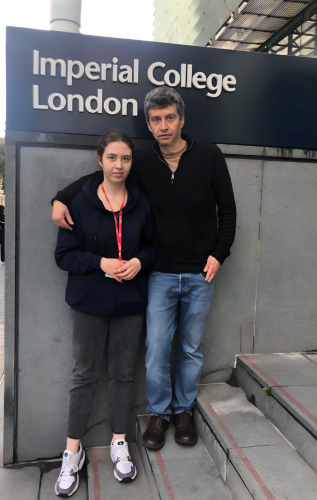Celebrating Disability History Month

“There is a lot of support at Imperial, from the Disability Advisory Service to the student mental health service, accommodation teams and academic tutors.”
Amy Lloyd Evans is a fourth-year medical student and Disabilities Officer for Imperial College Union.
Amy said that she first felt able to be open about, and celebrate, her disability when she joined Imperial.
“I’ve always been disabled and, even though I didn’t know it for a lot of my life, it’s shaped all my experiences, beliefs and values. I try my best to be welcoming and inclusive to everyone because I understand the feeling of being othered for something you can’t, or don’t want to, change.
“Disabled people are often put into situations where it feels safer to hide their disability if they can. In some ways this gives you agency over the way the world sees you, but it can feel like you have two separate identities: one that is acceptable to the world, and the real, unmasked version. It’s really isolating feeling like you’re hiding a part of your identity, and this was why I chose to start being open about my disability with my colleagues.”
As a medical student, Amy reflected on how her disability has helped her to connect with patients.
“People often comment on my patience and understanding, skills I try to emphasise because my own disability is often treated with impatience. It’s unfortunately a common experience that people are blamed for aspects of an illness or disability that are beyond their control.
“The skills and knowledge disabled people can bring to providing care for others is often overlooked. Instead, we tend to portray them as the recipients of care.”
Support for reasonable adjustments
The Disability Advisory Service offers a range of support for all students at Imperial, including the implementation of adjustments and support with seeking a diagnosis for some neurodiverse conditions.
Amy acknowledges that there is still work to be done on disability at Imperial, but that the support in place is thanks to the work of a dedicated community.
“It’s the most supported I’ve ever been, from the Disability Advisory Service, the student mental health service, accommodation teams, the health centre, academic tutors and senior tutors.”
Amy’s advice to other disabled students is to seek support for reasonable adjustments.
“Meeting your accessibility needs is, and should be, the bare minimum that is required of us as a society. Sometimes people can feel put out at having to implement adjustments because they are not used to it. This is not your fault and does not make you a burden.
“Putting aside your needs to avoid being made to feel like an inconvenience can come at a massive cost, and I believe this is a huge part of what disables us – living in a society that encourages you to accept not being accommodated.”
Advocacy for disabled students
Amy said she was inspired to run for the Disabilities Officer role because of the influence of a wellbeing officer at her secondary school, who used her personal experiences of disability to support and advocate for students.
“She was known for going above and beyond for us and was a wonderful example of how a person can turn their adversity into advocacy.
“She passed away before I joined Imperial, and I realised that by carrying forward her efforts to ensure disabled students have equal educational opportunities, I could honour her legacy. She was a real inspiration for me to advocate for disabled students here at Imperial.”
Read next
Access support from the Disability Advisory Service.
Find out what’s happening at Imperial for Disability History Month.